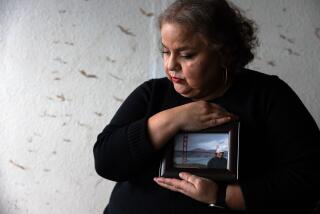San Bernardino killers revealed personal details in visa application
Syed Rizwan Farook told U.S. immigration officials in early 2014 that he had met his future wife on an “online website” and they decided to meet in Saudi Arabia after “several weeks of emailing,” according to records released Tuesday that provide new details about the San Bernardino killers.
The 21-page visa application file offers the first public look at the evidence that Farook, a U.S. citizen born in Chicago, gave immigration officials to prove he and Pakistani-born Tashfeen Malik had met in person and were planning to marry.
My fiance and I intend to marry within the first month of her arriving in the U.S.
— Syed Rizwan Farook, in a statement dated Jan. 20, 2014, nearly two years before the San Bernardino massacre
Malik’s file includes copies of their Saudi passport stamps and translations of Saudi visas, as well as a two-paragraph statement from Farook saying the two had met with their parents at a house belonging to one of Malik’s relatives in Mecca.
“My fiance and I intend to marry within the first month of her arriving in the U.S.,” Farook wrote in a statement dated Jan. 20, 2014, nearly two years before the couple was killed in a shootout with police following a rampage in San Bernardino that left 14 dead.
Farook wrote that “we met through a matrimonial website. We got engaged on 10/03/13 in Mecca, KSA when I went for Hajj.” The KSA is the Kingdom of Saudi Arabia and the Hajj is a annual Muslim pilgrimage to Mecca.
He said they did not use the services of an international marriage broker.
Farook also answered no to questions on whether he had ever committed “homicide, murder, manslaughter” or other crimes, including illegal drug use and domestic violence.
The couple had a religious wedding ceremony at the Grand Mosque -- the largest mosque in the world -- in Mecca before Malik moved to California in July 2014. They obtained a marriage certificate from the County of Riverside on Aug. 16, 2014, after a civil ceremony.
The visa application file was released by the House Judiciary Committee, which is investigating whether the visa was issued properly.
Despite charges from Republican lawmakers that the couple provided insufficient evidence to prove they had met in person, as required for a K-1 visa, Homeland Security officials say the couple met the legal requirements to be issued a visa.
After Malik arrived in the U.S. in July 2014, she married Farook and applied for a lawful permanent residency visa. At that time, Saudi officials confirmed to Homeland Security that the two had been in Saudi Arabia at the same time in October 2013.
“Tashfeen Malik’s immigration file contained sufficient evidence to establish that she intended to marry Syed Farook and that the two were together in Saudi Arabia before the fiancée petition was filed,” Joseph R. Holstead, a spokesman for U.S. Citizenship and Immigration Services, said in a statement Tuesday.
Some information in the file has been blacked out, including Farook’s Social Security number, contact information for his parents, as well as telephone numbers and email addresses.
The translations of the couple’s visas to enter Saudi Arabia appear to have been provided by Farook, following a “request for evidence” from the official reviewing the petition.
In his two-paragraph “intention to marry statement,” Farook describes how he and Malik met in person for the first time on Oct. 3, 2013, at a house belonging to one of Malik’s relatives “not too far from the Ajyad Hotel in Mecca.” The two were engaged on the same day, Farook wrote.
“My fiance and her family drove to from Riyadh to Mecca so that we could meet and it is on this day that we got engaged,” he wrote.
The statement is signed by Farook and dated Jan. 20, 2014. It is unclear from the file when Malik’s K-1 visa to enter the U.S. was approved. A stamp on the petition shows that Malik was admitted to the U.S. at O’Hare International Airport in Chicago on July 27, 2014.
The file appears to undermine criticism from some GOP lawmakers.
Senator Charles E. Grassley, (R-Iowa), chairman of the Senate Judiciary Committee, contended in a Dec. 10 hearing that Malik “apparently” had given a false home address on the visa application.
“Our government apparently didn’t catch the false address in Pakistan she listed on her application or other possible signs that she was radicalized or an operative,” Grassley said.
Malik stated in her application form that she lived at Awad House, 110-B, Babar Colony, MDA Chowk, in Punjab, Pakistan, between November 2009 to June 2013, and from October 2013 until December 2013, when she filled out the form.
She said she lived in Riyadh, Saudi Arabia, apparently with her father, in the intervening months.
She listed her birth city as Dera Ghazi Khan, a community in the center of Pakistan.
There was no indication in the documents that the addresses were false, and aides to Grassley have since suggested that he was simply inquiring after hearing media reports that she had given incorrect addresses.
Rep. Robert W. Goodlatte (R-Va.), chairman of the House Judiciary Committee, insisted Tuesday that immigration officials had failed to check the application carefully enough.
“Visa security is critical to national security, and it’s unacceptable that U.S. Citizenship and Immigration Services did not fully vet Malik’s application and instead sloppily approved her visa,” he said in a statement.
Elizabeth Kennedy Trudeau, a State Department spokesperson, responded that “all required procedures were followed in the K-1 visa case for Ms. Malik.”
More to Read
Sign up for Essential California
The most important California stories and recommendations in your inbox every morning.
You may occasionally receive promotional content from the Los Angeles Times.












